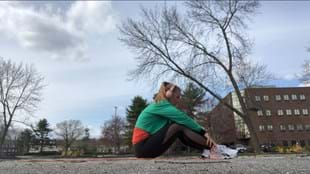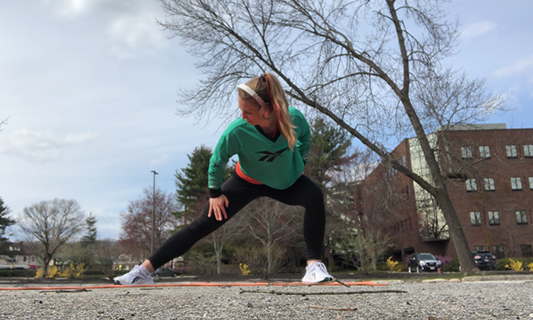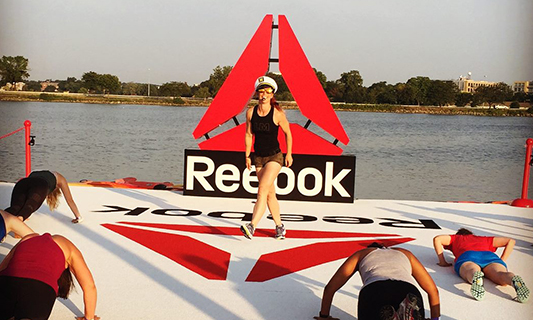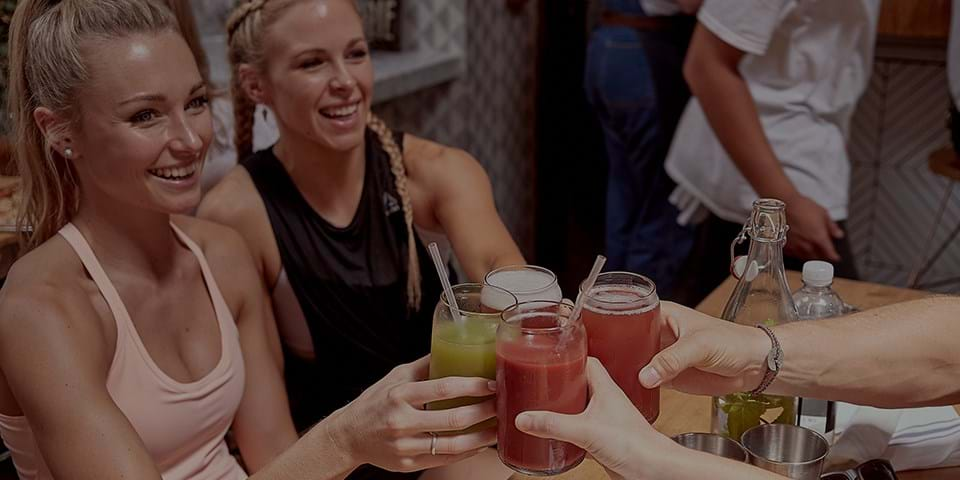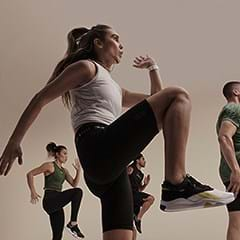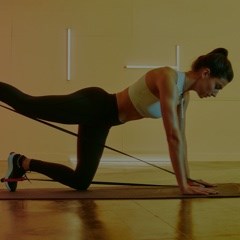This isn’t a story about someone who found fitness and it changed her life – Brooke Rosenbauer grew up as a super athletic overachiever. She was a young athlete and coach involved in soccer, alpine ski racing and ultimate frisbee. Brooke has studied international health, led sports-based youth development programs, become a personal trainer and group fitness instructor and established a career at Reebok.
It sounds like a typical trajectory for a fitness fanatic, but two pivotal events make Brooke different to most.
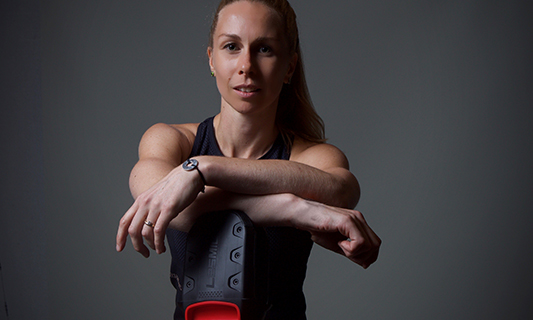
In her early twenties, Brooke was in a traumatic car accident. She spent 10 days in an Ecuadorian hospital before being medically evacuated back to the US. She was bedridden for many months and spent a long time learning to walk again.
Then, just last year, Brooke faced another international medical crisis. While holidaying in Greece, she suffered a pulmonary embolism (a life-threatening blood clot in the lung). She spent a month in a Greek hospital before returning to the US and again starting to rebuild her health and fitness from scratch.
We spoke to her about how dealing with dark times has refined her approach to fitness, and how she now coaches others to become the best versions of themselves.
Putting things into perspective is key
“Going through something that threatens your health, or even your life puts everything into perspective. You realize that nothing else matters if you aren’t healthy. Health truly is wealth.
“I’ve stopped worrying about being lean and how my clothes fit or how I look in photos. Now, my motivation is that I want to take care of my body. I want to feel empowered when I lift weights, or free when I run. If my stomach jiggles a little, it doesn’t upset me like it used to because I have more important priorities. I am now playing the long game, and I respect my physical body so much.
“Nurses told me I survived the pulmonary embolism because of my fitness level, but I feel that in the past I had been beating up on my body by pushing it too much. No more of that. I want to celebrate my body just like it is.
“Exercise can help discharge anxious energy or strong emotions that we might not be able to verbalize.”
“I now know exercise is an amazing way to reconnect with our bodies and take control of our lives. Exercise can help discharge anxious energy or strong emotions that we might not be able to verbalize. It is such a beautiful, healthy way to take care of ourselves. The secret is to honor the bodies we’re given and make sure to balance that exercise with rest and recovery.”
You never “win” at fitness – it’s an endless journey
“I tell my coaching clients that bumps can and will happen. You need to be able to make adjustments all the time because life never goes to plan. Your ability to throw the plan out the window and adapt makes all the difference. I always say yesterday is over, so don’t beat yourself up. Today is a new day and there are a lot of good things in the world.”
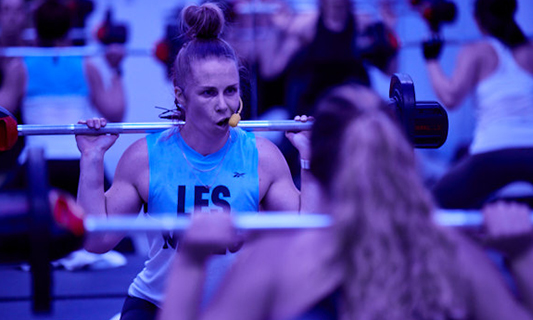
It’s okay to feel broken, powerless, weak, or vulnerable
“I've realized humans are capable of feeling multiple emotions at the same time. You can be scared and resolved, vulnerable and joyful, confident and weak. There have been times when I’ve felt broken and vulnerable because I was comparing my capabilities to a past self. As scared as I was, I also accepted that I wouldn’t be "broken" forever.
“There are some days that I still feel weak. We all have those days. Exercise has been a huge part of my recovery, because it helps me reconnect with my body; it helps me work through the emotions that are just too big to even talk about; and it has provided an incredible community that supports me and accepts me just as I am.”
Your greatest weakness can be your greatest strength
“I'm really stubborn, and my whole life I thought it was a bad attribute. It wasn't until I was in hospital in Greece when I realized my stubbornness was actually a positive. I was in a very low place, I thought that I might have to give up on my fitness career, but then a friend reminded me I was far too stubborn to do that. And that’s what got me through.
“I had also been very stubborn a few years earlier. I ran a half marathon just a few months after my accident forced me to learn to walk again. It wasn't the smartest thing to do, but I did it out of blind determination. It was born from someone congratulating me on being able to walk on my own. It was well-meaning, but I didn’t want to be congratulated for such a basic physical task. So I ran 13.1 miles to prove I could. I'm not sure I regret doing that run, but what was regrettable was that the healthcare system wasn’t really there making sure that I wasn't doing harm to myself. I had no idea if my body was really ready for this and nobody to help or guide me. It was this experience that really inspired my fitness career, so that I could help other people overcome health challenges and not feel so alone.”
"Building a healthy lifestyle can feel intimidating. There's way too much information out there, and it's really hard to get through it alone."
Self-love is at the center of wellness
“When we love and respect ourselves, we take better care of ourselves and fitness is no longer a chore or punishment, it’s something we do because it feels good. The reason I preach self-love so much is because fitness can have the opposite effect if we treat it as a punishment or a way to fill an emotional void. In that case, it can actually be really stressful. Power can be used for good or for evil – exercise is the same. When it comes from self-love, exercise is the healthiest thing we can do for ourselves.”
You don’t need serious health issues to feel the struggle
“Trauma doesn't always have to be dramatic, and it is much more prevalent than we realize. As we go through our lives, we accumulate experiences that shape our perceptions about what we can and cannot do. If you struggled with gym class or felt unloved for being out of shape, it can have a deep impact on your ability to engage with fitness, because you believe you’re unfit or unathletic.
“If you are struggling, it could be you’re working towards a goal that doesn’t serve you. Too often people just grab goals from Google, but they're setting themselves up to fail if there's no basis for that goal. Building a healthy lifestyle can feel intimidating. There's way too much information out there, and it's really hard to get through it alone. It's easy to feel like you're not succeeding if you don't know how to set the right goals.”
Having a coach in your corner pays off
“Whatever your fitness level, and wherever you are on your fitness journey, having a professional in your corner can be amazing. The benefit of a coach is that they ask powerful questions, and they might make you realize that the trade-offs required for achieving a goal might not actually be what you want – and that can be really liberating. I think the difference between a trainer and a coach can be those conversations. While trainers deliver you exercises, they may not push you on your goals or your perceptions. A good coach will find a way to help seek what you're looking for, but maybe find it in a different way. And they will help you navigate any storms or bumps in the road. A good coach will always cheer you on. But you always need to be your own cheerleader too."
BROOKE’S SECRETS TO SUCCESS
- Self-love is at the center of wellness – respect and honor the body you’ve got and the life you’ve been given
- Seek help as a practice – not just at your lowest points
- Turn your pain into power by focusing on what you’ve gained versus what you’ve lost
- Celebrate small wins – it could be doing one push up on your toes, making a smart food choice, or choosing a 45-minute workout over the 30-minute option.
- Try different types of exercise until you find something you love.
- Find a good coach who will listen to you and build a program that is customized for you.



